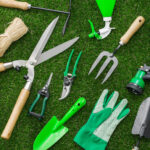10 Essential Garden Maintenance Tips for a Healthy and Beautiful Garden
Maintaining a garden requires more than just planting and watering. Regular garden maintenance is essential for keeping your plants healthy and beautiful, and it can also save you time and money in the long run.
In this blog post, we’ll provide you with 10 essential garden maintenance tips that will help ensure your plants stay healthy and look their best. Let’s get started.
10 Garden Maintenance Tips for a Healthy Garden
Here are 10 essential garden maintenance tips that will help you maintain a healthy and beautiful garden.
1) Watering
Watering is essential for plant growth, but it can also be tricky. Overwatering can lead to root rot, while underwatering can cause plants to wilt and die. To water plants effectively, follow these tips:
- Water deeply and infrequently. This encourages deep root growth and helps plants withstand drought.
- Water in the morning or evening when the sun is not as strong. This reduces water loss due to evaporation.
- Water at the base of the plant rather than from above. This helps prevent disease and encourages better root growth.
2) Mulching
Mulching is one of the easiest and most effective ways to maintain a healthy garden. It helps conserve moisture, suppress weeds, and regulate soil temperature. To mulch effectively, follow these tips:
- Use organic mulch, such as bark, leaves, or straw. This will break down over time and add nutrients to the soil.
- Apply mulch 2-3 inches deep around the base of plants. This helps retain moisture and suppress weeds.
- Avoid piling mulch against the stem of plants. This can lead to disease and rot.
3) Fertilising
Fertilising is essential for healthy plant growth, but it can be confusing. There are many types of fertiliser available, and it can be difficult to know which one to use. To fertilise effectively, follow these tips:
- Choose a fertiliser based on the needs of your plants. Different plants have different nutrient requirements.
- Follow the instructions on the fertiliser package. Over fertilising can damage plants.
- Apply fertiliser in the spring and summer when plants are actively growing.
4) Pruning
Pruning is essential for maintaining the shape and health of plants. It helps remove dead or diseased wood and encourages new growth. To prune effectively, follow these tips:
- Use sharp, clean pruning shears. Dull or dirty shears can damage plants.
- Cut just above a healthy bud or branch. This encourages new growth.
- Prune in the dormant season or after flowering.
5) Deadheading
Deadheading is the process of removing spent flowers from plants. It helps promote continuous blooms and prevents the plant from using energy to produce seeds. To deadhead effectively, follow these tips:
- Use sharp, clean scissors or pruning shears. This prevents damage to the plant.
- Cut just above a healthy bud or leaf. This encourages new growth.
- Deadhead regularly throughout the growing season.
6) Controlling pests and diseases
Pests and diseases can quickly destroy a garden if left unchecked. Regular monitoring and control measures can prevent these problems from getting out of hand. To control pests and diseases effectively, follow these tips:
- Identify the problem. Different pests and diseases require different control measures.
- Use organic methods, such as handpicking, insecticidal soap, or neem oil. This reduces the risk of chemical exposure.
- Monitor plants regularly for signs of stress or disease.
7) Weeding and lawn mowing
Weeds compete with plants for water and nutrients and can quickly take over a garden if left unchecked. Regular weeding can help maintain a neat and healthy garden. To weed effectively, follow these tips:
Pull weeds by hand or use a hoe or cultivator. This helps prevent weed regrowth.
- Remove weeds between garden beds and in other areas before they go to seed. This helps prevent future weed growth.
- Apply a layer of mulch to suppress weed growth.
8) Maintaining soil health
Soil health is essential for healthy plant growth. Soil that is too compacted or lacking in nutrients can lead to poor plant growth and disease. To maintain soil health, follow these tips:
- Test soil pH and nutrient levels regularly. This helps you know what amendments to add.
- Add organic matter, such as compost or aged manure, to improve soil structure and nutrient content.
- Rotate crops to prevent nutrient depletion and disease buildup.
9) Monitoring and adjusting light levels
Light is essential for plant growth, but too much or too little light can be harmful. To monitor and adjust light levels effectively, follow these tips:
- Know the light requirements of your plants. Different plants have different light requirements.
- Observe how much light your garden gets throughout the day. This helps you know which areas receive full sun, partial shade, or full shade.
- Use shade cloth or move plants to different locations to adjust light levels as needed.
10) Regular maintenance and observation
Regular maintenance and observation are essential for a healthy and beautiful garden. Regular monitoring and maintenance can prevent problems from getting out of hand and save you time and money in the long run. To maintain your garden effectively, follow these tips:
- Establish a regular maintenance routine. This helps you stay on top of garden tasks.
- Observe plants regularly for signs of stress or disease. Early detection can prevent problems from getting worse.
- Take time to enjoy your garden. Gardening can be a relaxing and enjoyable hobby.
Common Garden Maintenance Mistakes to Avoid
Garden maintenance can be a rewarding hobby, but it can also be easy to make mistakes that can harm your plants or lead to a less-than-beautiful garden. Here are some common garden maintenance mistakes to avoid:
1. Overwatering
Overwatering is one of the most common garden maintenance mistakes. While plants need water to survive, too much water can lead to root rot and other problems. To avoid overwatering, make sure you’re not watering too frequently, and be sure to let the soil dry out a bit between waterings.
If you own a lawn, make sure that all lawn areas get as much water as they need to keep looking lush.
2. Using the Wrong Fertiliser
Fertiliser is essential for healthy plant growth, but using the wrong type or amount of fertiliser can do more harm than good. Make sure you choose a fertiliser that is appropriate for your plants’ needs, and be sure to follow the instructions on the package carefully.
3. Pruning at the Wrong Time
Pruning is essential for maintaining the shape and health of plants, but pruning at the wrong time can do more harm than good. For example, pruning in the fall can encourage new growth that may be killed off by winter frost. Make sure you know the appropriate time to prune each of your plants, and follow the appropriate techniques for each one.
4. Neglecting Soil Health
Soil health is essential for healthy plant growth, but it’s easy to neglect. Make sure you’re testing your soil regularly and amending it appropriately with organic matter such as compost, aged manure, or other soil amendments.
5. Not Monitoring for Pests and Diseases
Pests and diseases can quickly destroy a garden if left unchecked. Regular monitoring and control measures can prevent these problems from getting out of hand. Make sure you’re monitoring your plants regularly for signs of stress or disease and taking appropriate action to control pests and diseases.
6. Using Chemical Pesticides and Fertilisers
Chemical pesticides and fertilisers can be harmful to plants, animals, and the environment. Instead of using chemical products, try using organic methods for pest control and fertilisation. For example, companion planting, handpicking, and natural pest control products can all be effective and safe alternatives.
7. Ignoring Sun and Shade Requirements
Different plants have different light requirements. Ignoring these requirements can lead to poor plant growth, disease, and even death. Make sure you’re placing your plants in appropriate locations based on their sun and shade requirements and adjust as necessary throughout the growing season.
8. Not Cleaning Garden Tools
Garden tools can harbour bacteria, fungi, and other harmful organisms that can spread disease throughout your garden. Make sure you’re cleaning your garden tools regularly with soap and water, and disinfecting them with a bleach solution if necessary.
By avoiding these common garden maintenance mistakes, you can help ensure that your garden stays healthy and beautiful throughout the growing season.
Do You Need a Professional Gardening Service?
To ensure a maintained garden, healthy fruit trees, and blossoming flowers, you need a gardening service that can help you with the necessary tasks, such as hedge trimming, pruning, fertilising, pest control, rubbish removal services for green waste, and other services.
Conclusion
Maintaining a healthy and beautiful garden requires more than just planting and watering. Regular garden maintenance tasks, such as watering, mulching, fertilising, pruning, deadheading, controlling pests and diseases, weeding, maintaining soil health, monitoring and adjusting light levels, and regular maintenance and observation, are essential for healthy plant growth and a beautiful garden.
At Gardening Direct, we want to help you keep your garden looking its best. We offer a wide range of products and gardening services, from seeds and plants to fertilisers, mulches, pest control products, and more. With our products and advice, you can ensure that your garden is healthy, thriving, and beautiful for years to come. Contact us today to learn more.



